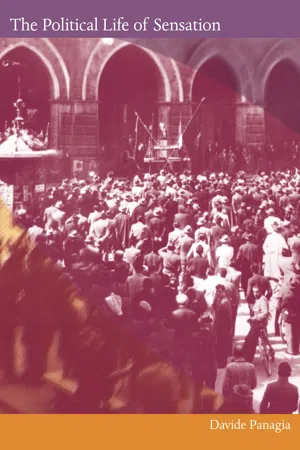The Political Life of Sensation
About this book
Panagia claims that the rule of narrative governs our inherited notions of political subjectivity and agency, such that reading and writing are the established modes of political deliberation. Yet the contemporary citizen-subject is a viewing subject, influenced by film, photos, and other perceptual stimuli as much as by text. Challenging the rule of narrative, Panagia analyzes diverse sites of cultural engagement including the visual dynamics portrayed in the film The Ring, the growth of festival culture in late-fifteenth-century Florence, the practices of convivium espoused by the Slow Food movement, and the architectural design of public newsstands. He then ties these occasions for sensation to notable moments in the history of political thought and shows the political potential of a dislocated subjectivity therein. Democratic politics, Panagia concludes, involves a taking part in those everyday practices that interrupt our common modes of sensing and afford us an awareness of what had previously been insensible.
Frequently asked questions
- Essential is ideal for learners and professionals who enjoy exploring a wide range of subjects. Access the Essential Library with 800,000+ trusted titles and best-sellers across business, personal growth, and the humanities. Includes unlimited reading time and Standard Read Aloud voice.
- Complete: Perfect for advanced learners and researchers needing full, unrestricted access. Unlock 1.4M+ books across hundreds of subjects, including academic and specialized titles. The Complete Plan also includes advanced features like Premium Read Aloud and Research Assistant.
Please note we cannot support devices running on iOS 13 and Android 7 or earlier. Learn more about using the app.
Information
Table of contents
- Contents
- Illustrations
- Grazie
- Prologue: Narratocracy and the Contours of Political Life
- One: From Nomos to Nomad: Kant, Deleuze, and Rancière on Sensation
- Two: The Piazza, the Edicola, and the Noise of the Utterance
- Three: Machiavelli’s Theory of Sensation and Florence’s Vita Festiva
- Four: The Viewing Subject: Caravaggio, Bacon, and The Ring
- Five: ‘‘You’re Eating Too Fast!’’: Slow Food’s Ethos of Convivium
- Epilogue: ‘‘The Photographs Tell It All’’: On an Ethics of Appearance
- Notes
- Bibliography
- Index
